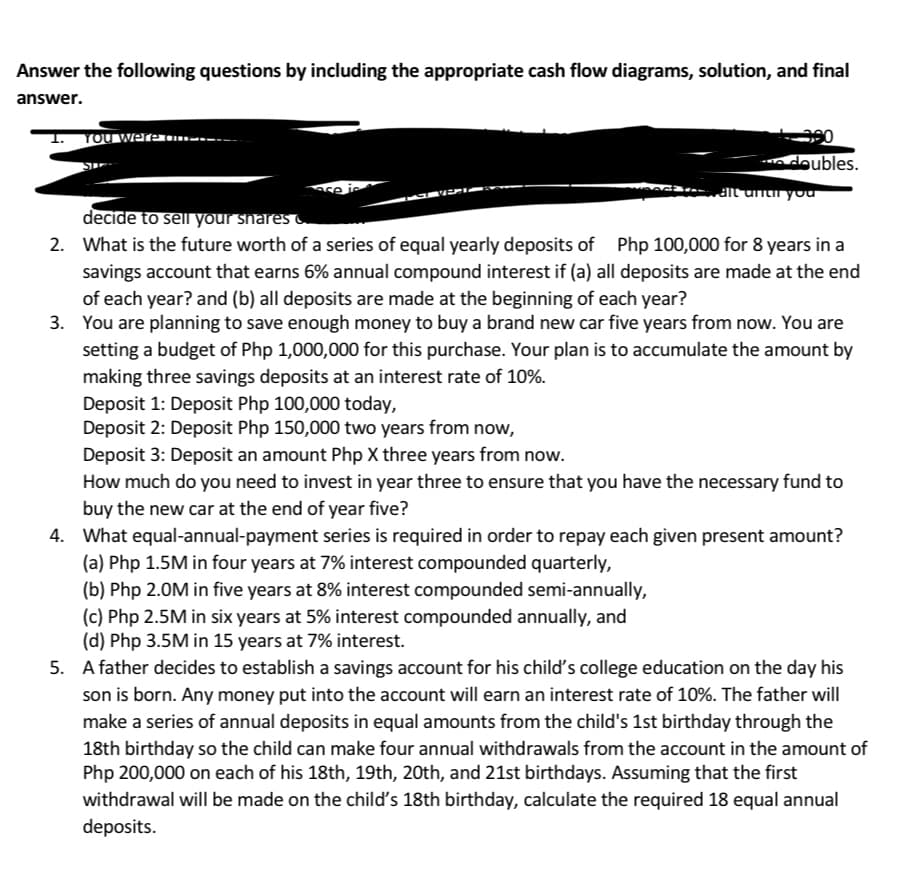2. What is the future worth of a series of equal yearly deposits of Php 100,000 for 8 years in a savings account that earns 6% annual compound interest if (a) all deposits are made at the end of each year? and (b) all deposits are made at the beginning of each year?
2. What is the future worth of a series of equal yearly deposits of Php 100,000 for 8 years in a savings account that earns 6% annual compound interest if (a) all deposits are made at the end of each year? and (b) all deposits are made at the beginning of each year?
Chapter1: Making Economics Decisions
Section: Chapter Questions
Problem 1QTC
Related questions
Question
Please answer 2-5 only.

Transcribed Image Text:Answer the following questions by including the appropriate cash flow diagrams, solution, and final
answer.
1. YOU wereom..
doubles.
alt unch you
decide to sell your snares
2. What is the future worth of a series of equal yearly deposits of Php 100,000 for 8 years in a
savings account that earns 6% annual compound interest if (a) all deposits are made at the end
of each year? and (b) all deposits are made at the beginning of each year?
3. You are planning to save enough money to buy a brand new car five years from now. You are
setting a budget of Php 1,000,000 for this purchase. Your plan is to accumulate the amount by
making three savings deposits at an interest rate of 10%.
Deposit 1: Deposit Php 100,000 today,
Deposit 2: Deposit Php 150,000 two years from now,
Deposit 3: Deposit an amount Php X three years from now.
How much do you need to invest in year three to ensure that you have the necessary fund to
buy the new car at the end of year five?
4. What equal-annual-payment series is required in order to repay each given present amount?
(a) Php 1.5M in four years at 7% interest compounded quarterly,
(b) Php 2.0M in five years at 8% interest compounded semi-annually,
(c) Php 2.5M in six years at 5% interest compounded annually, and
(d) Php 3.5M in 15 years at 7% interest.
5. A father decides to establish a savings account for his child's college education on the day his
son is born. Any money put into the account will earn an interest rate of 10%. The father will
make a series of annual deposits in equal amounts from the child's 1st birthday through the
18th birthday so the child can make four annual withdrawals from the account in the amount of
Php 200,000 on each of his 18th, 19th, 20th, and 21st birthdays. Assuming that the first
withdrawal will be made on the child's 18th birthday, calculate the required 18 equal annual
deposits.
Expert Solution
This question has been solved!
Explore an expertly crafted, step-by-step solution for a thorough understanding of key concepts.
Step by step
Solved in 3 steps

Knowledge Booster
Learn more about
Need a deep-dive on the concept behind this application? Look no further. Learn more about this topic, economics and related others by exploring similar questions and additional content below.Recommended textbooks for you


Principles of Economics (12th Edition)
Economics
ISBN:
9780134078779
Author:
Karl E. Case, Ray C. Fair, Sharon E. Oster
Publisher:
PEARSON

Engineering Economy (17th Edition)
Economics
ISBN:
9780134870069
Author:
William G. Sullivan, Elin M. Wicks, C. Patrick Koelling
Publisher:
PEARSON


Principles of Economics (12th Edition)
Economics
ISBN:
9780134078779
Author:
Karl E. Case, Ray C. Fair, Sharon E. Oster
Publisher:
PEARSON

Engineering Economy (17th Edition)
Economics
ISBN:
9780134870069
Author:
William G. Sullivan, Elin M. Wicks, C. Patrick Koelling
Publisher:
PEARSON

Principles of Economics (MindTap Course List)
Economics
ISBN:
9781305585126
Author:
N. Gregory Mankiw
Publisher:
Cengage Learning

Managerial Economics: A Problem Solving Approach
Economics
ISBN:
9781337106665
Author:
Luke M. Froeb, Brian T. McCann, Michael R. Ward, Mike Shor
Publisher:
Cengage Learning

Managerial Economics & Business Strategy (Mcgraw-…
Economics
ISBN:
9781259290619
Author:
Michael Baye, Jeff Prince
Publisher:
McGraw-Hill Education